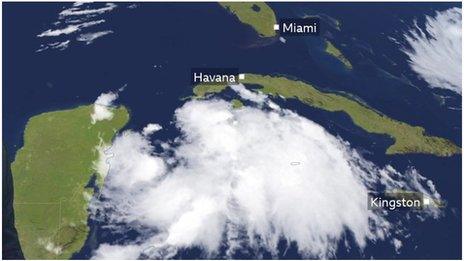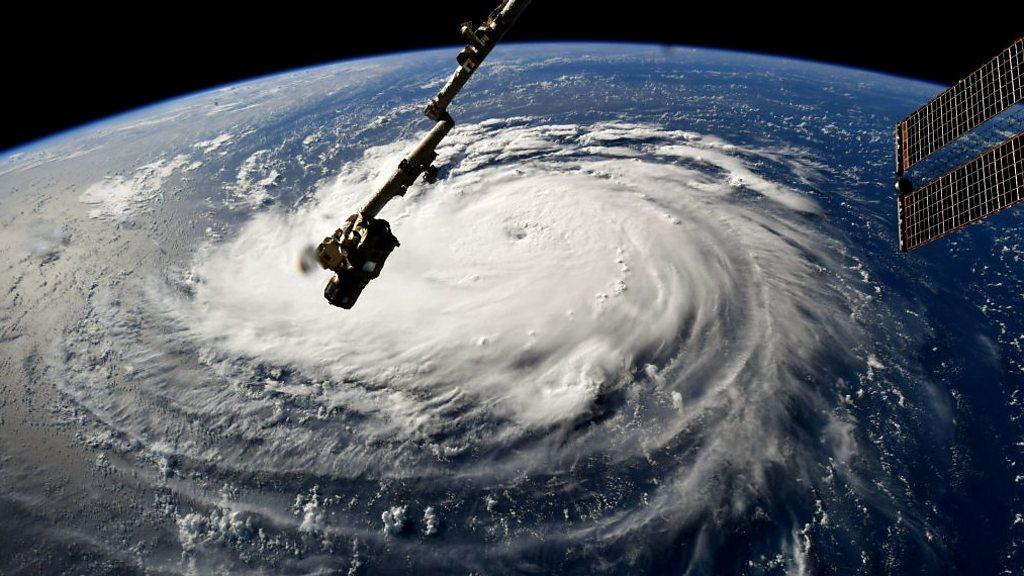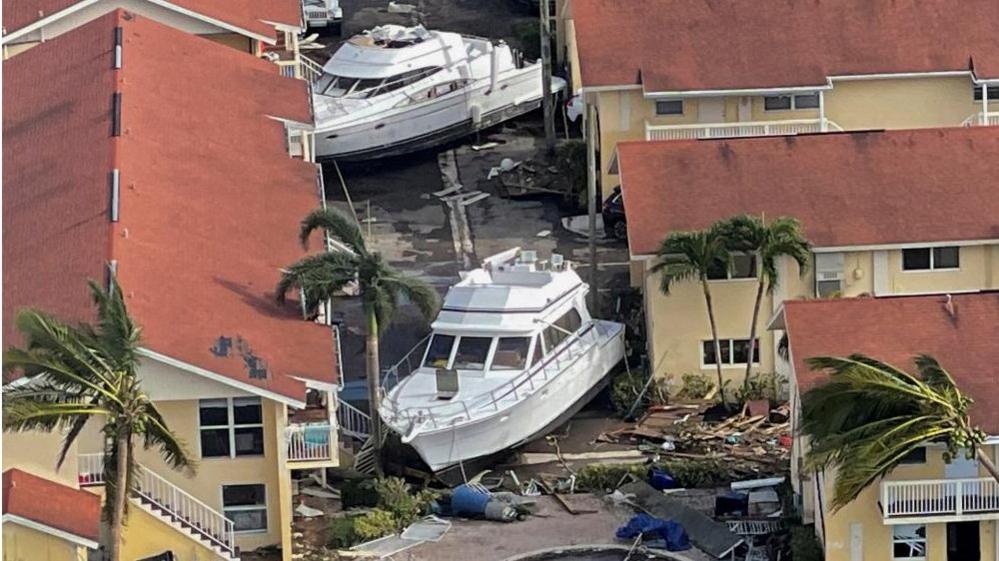Tropical Storm Idalia: Two dead in Florida as storm slams into Georgia
- Published
Watch: Hurricane Idalia: 12 hours in 80 seconds
Tropical Storm Idalia is barrelling through Georgia after its fierce winds and torrential rains lashed Florida, where it was blamed for two deaths.
Idalia, which landed as a powerful hurricane in Florida's Big Bend area, still poses a major flood threat.
Roads and towns were submerged in knee-deep water, and the National Hurricane Center (NHC) warned of "rising water moving inland from the coastline".
Emergency crews are working to rescue trapped residents and clear debris.
At 17:00 EDT (21:00 GMT) Idalia was packing 70mph (110km/h) winds over south-eastern Georgia and tracking in a north-easterly direction.
Some 470,000 customers in Georgia and Florida were without power, according to the PowerOutage.us tracking website.
Across the Big Bend region, some communities were cut off by floodwaters and fallen trees, with people seen wading and canoeing to safety.
The Florida Highway Patrol reported two deaths on Wednesday related to the storm:
In Alachua County, a 59-year-old Gainesville man died after his pick-up truck hit trees in "extremely rainy conditions"
A 40-year-old man from Spring Hill "lost control" of his Ford Ranger in Pasco County and struck a tree
Florida Governor Ron DeSantis said all eight of the state's urban search-and-rescue teams had been deployed, while some 5,500 National Guardsmen were helping clear roads of debris and thousands of repairmen were working to restore power.
The federal government has also sent thousands of emergency personnel, as well as drinking water and more than a million ready-to-eat meals to Florida, the White House said in a statement.
Watch: 'The town of Cedar Key is completely underwater'
In calls with Mr DeSantis and three other state governors, President Joe Biden pledged his administration's full support on hurricane relief and recovery efforts.
"I don't think anybody can deny the impact of the climate crisis anymore," Mr Biden said on Wednesday. "Just look around."

Dan Montey and his wife Sherri were rescued on Wednesday morning from floodwaters in Hudson, north of Tampa.
"We were warned last time and it didn't come, so this time we thought we'd wait it out," Mr Montey said, as the couple climbed out of a rescue vehicle. "Well, here we are. Never trust the weatherman."
Residents of Hudson had a foot or two of water in their homes. Authorities warned the tide could rise further later on Wednesday.
Along Pasco County, sheriffs say they have pulled about 40 people out of the water, while other locals have been brought out of their houses by boat, and an unknown number remain in the low-lying coastal neighbourhoods.
In Tallahassee, Florida's First Lady Casey DeSantis said on social media that her family was safe after a huge oak tree fell on the governor's mansion while she and their three children were inside.
Watch: Fierce winds and flooding batter coastal Florida towns as Idalia tears through
Idalia intensified into a Category 4 hurricane - with wind speeds of about 130mph - before making landfall as a Category 3 at 07:50 local time (12:50 BST) on Wednesday at Keaton Beach.
The small town of about 13,000 people is in the sparsely populated Big Bend region, which sits on Florida's so-called nature coast, where the Gulf of Mexico peninsula merges into the panhandle.
According to the NHC, no major hurricane has tracked into that part of north-western Florida since 1851.
At least 27 of the state's 67 counties were under some form of evacuation order, including 13 mandatory orders in western and central Florida.
Major airports and tourist attractions including Walt Disney World suspended operations as well.
But there were widespread reports of people refusing to evacuate and being trapped in their homes, with emergency crews working to rescue them.
"I ain't going nowhere," said John Paul Nohelj, a resident of the town of Steinhatchee.
"If you live near water, you're going to get a wet butt once in a while, and that's just the way it is."
Michael Bobbitt, who was sheltering on the second floor of his two-storey home on Florida's Cedar Key island, told the BBC the entire downtown was underwater.
"Part of a whole hotel just broke apart and went into the Gulf. It's like the Gulf is trying to swallow us up," he said.
Even as its winds subside, Idalia was expected to bring heavy rain and flooding to Georgia and the Carolinas.
The 2023 Atlantic hurricane season is forecast to be more active than average, with the peak of the season still two weeks away.
The impact of climate change on the frequency of tropical storms is still unclear, but increased sea surface temperatures warm the air above and make more energy available to drive hurricanes.
As a result, they are likely to be more intense with more extreme rainfall.
Additional reporting from Sam Cabral and Max Matza
Watch: How quickly water rises in a storm surge

Are you personally affected by tropical storm Idalia? If it is safe to do so, you can get in touch by emailing haveyoursay@bbc.co.uk, external.
Please include a contact number if you are willing to speak to a BBC journalist. You can also get in touch in the following ways:
WhatsApp: +44 7756 165803
Tweet: @BBC_HaveYourSay, external
Please read our terms & conditions and privacy policy
If you are reading this page and can't see the form you will need to visit the mobile version of the BBC website to submit your question or comment or you can email us at HaveYourSay@bbc.co.uk, external. Please include your name, age and location with any submission.
Related topics
- Attribution
- Published28 August 2023

- Published29 August 2023

- Published30 September 2022
